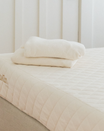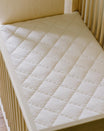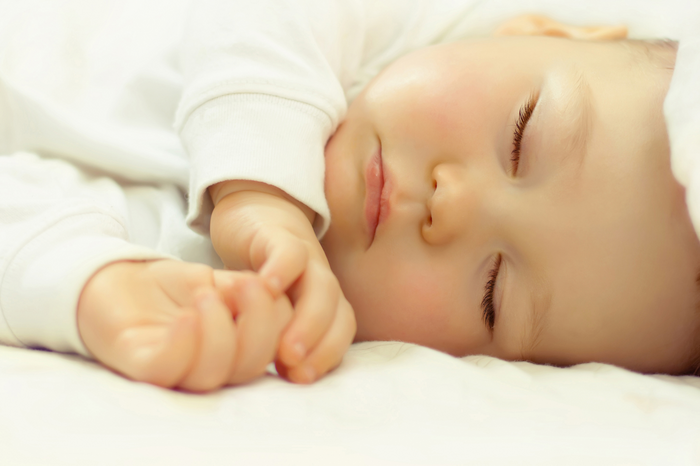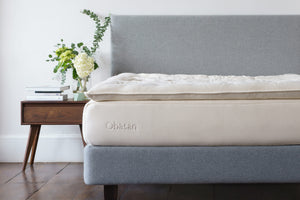This month, we interviewed Christina Hamill, local Cranial Sacral Practitioner on the subject of sleep health for babies. She has extensive experience working with babies, children and parents and has some great insights on how to help our babies get the most peaceful and restorative sleeps.
Christina is a member of the APPPAH (Association For Prenatal And Perinatal Psychology And Health), the organization that initiated public recognition of Birth Psychology Month, as well as a Pre and Perinatal Educator. In 2016, she started bringing awareness to birth psychology in her community, in Duncan, BC.
Check out her interview below:
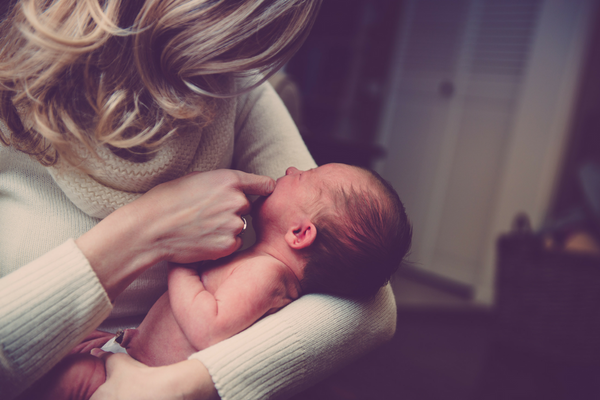
What experience do you have working with babies and children?
It's quite diverse: from being a nanny, to teaching preschoolers and teens in Japan, to running my own daycare (so I could stay home with my baby daughter). I later discovered a holistic Infant Toddler program that deepened my understanding of children. Part of it included embryology (the study of embryo development) which got me interested in broadening my work to support mothers and babies during pregnancy and birth. This motivated me to take two doula trainings to add to my skill set of working with families. As a daycare provider, parents frequently asked me for guidance with their children. Taking the Simplicity Parenting Coach training gave me further skills to meet them in their questions and offer them practical tools. I am a constant learner of child development, regularly attending conferences and workshops to meet my own curiosity, reflect upon it and discover new insights.
How did you get into cranial sacral work?
When my daughter was younger, she had two head injuries. I asked her teacher what she recommended I do to further support my daughter’s recovery, and she suggested craniosacral therapy. At the time, we had to go to Victoria for appointments. During a visit, I noticed a flyer in the waiting room for a biodynamic craniosacral therapy training. In that moment, I realized that the Cowichan Valley needed a local biodynamic craniosacral therapist. I decided to take the training, and the rest is history.
How important is sleep to a baby's emotional and physical development, and what would you suggest to help parents prepare their baby for sleep?
Sleep is a sensitive time for babies both consciously and subconsciously. Consciously so because the time of falling asleep can feel like a separation and that can trigger all kinds of unsettling anxious emotions. Subconsciously because this is a crucial time when their body is recuperating, restoring, and developing at the deepest level. One of the best things parents can do for their little one to support sleep is to establish a consistent daily rhythm from morning until night, because this helps cue their baby for what is to come and makes transitions easier.
Babies need to be gently and lovingly supported and reassured when crossing the threshold into sleep. They need a calming consistent sequence of actions that prepares and cues them for sleep. It’s practical to learn by heart a short nursery rhyme and a lullaby and to include soothing touch. Babies love repetition, so I encourage parents to choose a nursery rhyme and song they like! The bonus with hearing their own parent’s voice is that it activates the neural pathways for speech and language development.
Another very important aspect of quality healthy sleep is to provide babies with 100% natural breathable sleepwear and linens, as well as chemical free bedding, whether using a crib, co-sleeper, or co-sleeping directly on their parents' bedding. Synthetic materials are not breathable and result in energy expended in negotiating body temperature which competes with the body’s intuitive time to restore. A baby’s sleep time is a sacred time. It is wise to protect babies from chemicals because when toxicity bombards the nervous system it weakens a baby’s vital forces needed for optimal growth and development.
Are there any signs that parents can look for, to help identify that their baby is struggling with their sleep?
Babies are good at showing when they are struggling with feeling tired. They tend to have droopy eyes, rub their eyes, disengage from eye contact, rub their ears, pull on their ears, get irritable, nuzzle their head into mum or dad's chest or a blanket, and can look “tipsy” or lethargic. It is best for babies to be cued for sleep before they are overtired. Gradually establishing a daily rhythm helps support healthy sleep habits and ideally prevents struggles with sleep.
With my maternity clients, I actually encourage sleep rhythms to get established as early as during pregnancy. Parents can start reading a story and singing a lullaby to their unborn baby at regular times. Parents who do this notice how quickly their baby is soothed and ready for sleep when the same story and lullaby are used after birth.
Basic struggles with sleep can be the result of the daily rhythm being interrupted, such as travelling or too much stimulus. When parents keep this in mind, they can be calm and integrate strategies, such as taking pauses to connect with their baby in a quiet place, which can help soften the impact of the rhythm being off. Struggling with sleep can also be due to a baby going through a growth spurt and being more hungry than usual or not feeling well. Babies and children are often sick in the middle of the night, so its ideal for parents to have a first aid kit that includes some holistic remedies. I also recommend they own a Lilipoh Children’s Health Guide published by the Wellness Nurses of the Los Angeles Alliance for Childhood.
When struggles with sleep are chronic, I would suggest parents take their baby to their family doctor and to a craniosacral therapist because it is likely that there was a complication in utero or during birth (with mum and/or baby) that is inhibiting the healthy regulation of their autonomic nervous system.
What kind of treatments do you offer babies, and what changes do you notice?
Biodynamic Craniosacral Therapy (BCST) is a gentle touch therapy safe for babies and ideal for them because they respond so well to it. BCST tunes into the health already present in their system, which initiates a healing response in both the fluid and fascial networks. This interaction promotes the release of tension patterns, making it possible for the body to realign itself. Each baby has unique healing priorities, so treatments vary.
Pregnant mums come to see me throughout their pregnancy for general health support and stress management, knowing that their health affects their baby’s health. They also come to receive support with prenatal bonding, especially if they’ve experienced previous pregnancy loss. Sometimes pregnant mothers come for treatment when their baby is malpresenting (the baby is not in the ideal position for birth). So you could say I treat babies via their mother as early as in utero.
Parents usually ask for treatments for their newborn when they notice something feels “off” with their baby or they are aware that the birth experience was traumatic. I also treat babies for torticollis, misshapen heads, digestive issues, sleep issues, and so on. Parents also come to see me when mum and baby are having breastfeeding challenges and/or there is a suspected tongue tie. I am trained to assess for true and faux tongue tie and in craniosacral therapy specific to supporting successful infant breastfeeding.
The changes that parents and I notice in babies are quite amazing. During a BCST session, parents often say they’ve never seen their baby so calm before. We witness babies going into dreamy places, letting go of tension patterns and feeling able to deeply settle into their bodies. They can also express emotions for the first time where there was no space and/or support to do so before, and let go of any related holding patterns.
Any final words to parents about sleep?
Adjusting to having a newborn in the home is so much easier when lots of support is in place ahead of time for the first 6 months: meals in the freezer, diaper service, someone to clean the house for you, etc. If mum is stressed and tired, baby will feel it and become stressed and tired too. Babies are a whole sense organ—they feel everything. I’m a huge advocate for layers of support for the parents, which allows the parents time to be relaxed and have skin to skin time with their baby. This establishes a sense of calm and safety in the baby’s amygdala (the part of the brain that detects emotions and prepares for survival situations), making it easier to settle into deep sleep. I know mums have heard this time and time again, but really it’s so important that mum sleeps when baby sleeps because if a mother’s autonomic nervous system is not regulating, than neither will her baby’s.
Learn more about Christina and contact her for information about her practice at http://cowichancraniosacral.com/about/
Find support for your baby's better night's sleep in our store's online baby collection.





